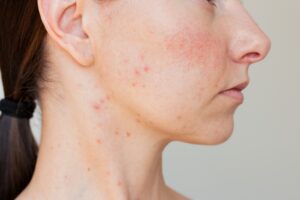Lots of odd things can show up on your skin. How do you know what to be concerned about and when to treat the issue yourself? Eczema is a good example of something that can look like many other things:
- Dry or itchy skin
- A rash or bumps
- Flaky or thick patches of skin
- Swelling
- Discoloration
To make it more confusing, eczema can show up anywhere on your body, at any age. According to the Cleveland Clinic, 31 million Americans suffer from this condition, so if you have it, you’re not alone.
What Is Eczema?

Eczema is a form of atopic dermatitis, a condition that causes skin inflammation.
The good news is that it can be managed, and it doesn’t cause any damage to your body. The bad news is that even if you didn’t have it as a child, it can show up in your adult years.
“Eczema can look like many other dermatological conditions,” said Claire-Audrey Bayan, MD, FAAD, of Golden State Dermatology. “The vast amount of information available online can be quite confusing, potentially leading to misdiagnosis and treatment delays. The quickest way to calmer, healthier skin is an accurate diagnosis by a specialist.”
Is It Contagious?
Eczema is not contagious. But if you have it, it increases the chances of germs getting into your body through cracks in your skin, which raises your risk of viral, bacterial, and fungal skin infections.
And while you can’t spread it to another person, you can spread it on your own person. The more you scratch, the itchier you become, and the more inflamed the skin. That inflammation can spread to other parts of your body.
How to Treat Eczema
Given that eczema can be confused with many other skin conditions, it’s best to see a dermatologist first to make sure you’re treating the specific issue. With a diagnosis, you can make lifestyle changes to manage the condition.
Daily habits to decrease the itch factor:

- Moisturize. Hydrated skin is a better barrier between you and potential irritants. To get the most benefit, apply moisturizer right after a short bath or shower to lock in the moisture. And the heavier the better! “Vaseline-based products work better than lotions,” says Dr. Bayan.
- Read labels. Look for fragrance-free and dye-free products for anything that either directly touches your skin, like deodorant or make-up, or goes into things that touch your skin, like laundry detergent. (Unscented means the fragrance has been covered up. It’s still there.)
- Test first. Before using a new skincare product, test it on a small patch of skin for 7-10 days. If your skin doesn’t react, then it’s safe to put it on the rest of your body.
- Shorter is better. Limit baths or showers to 5-to-10-minutes, and keep the temperature warm, versus hot. Long soaks actually dry out the skin.
- Dress loosely. You may already have learned through trial and error what kind of clothing is least irritating. Generally loose-fitting apparel is best, with no tags or raised internal seams, and smooth fabrics (like silk) or 100% cotton.
- Avoid extremes. If you can, try to protect yourself from extreme cold or heat. Cold and sweat can be triggers for a flare-up.
- Stay calm. Stress is another trigger for eczema. While you can’t avoid it (and it’s not healthy to never have stress), experiment with different methods of reducing stress, like exercise, meditation, getting more sleep, or deep breathing.
- Track your triggers. Allergens in food, on surfaces, and in the air can trigger your eczema. Try to notice what’s around you, and what you’re eating and drinking. The more aware you are, the more you can tailor your environment to reduce flare-ups.
Dermatologist Treatments

Often, people will self-diagnose and use an over-the-counter anti-itch medication. Given that eczema can appear like many other skin conditions, we recommend a diagnosis to find the best treatment, as well as getting a professional perspective on any other health conditions that may be related.
A dermatologist may prescribe topical steroid creams and ointments, as well as non-steroid anti-inflammatory creams and ointments. Depending on the type and severity, they may prescribe oral antihistamines to decrease itchiness. And if an infection is present, they may prescribe antibiotics as well.
If you have questions about your skin, schedule an appointment at a Dermatology Center of Northern California office near you. We’ll take a look at any areas of concern and ask questions to understand the full picture of your skin health.



